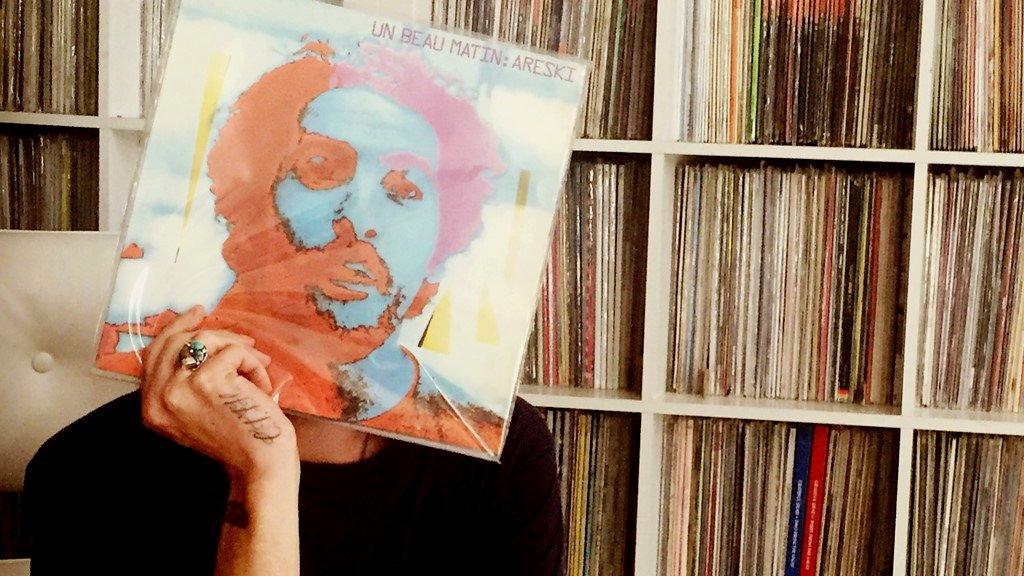Sync or swim: How TV shows like Love Island are breaking new bands
- Published
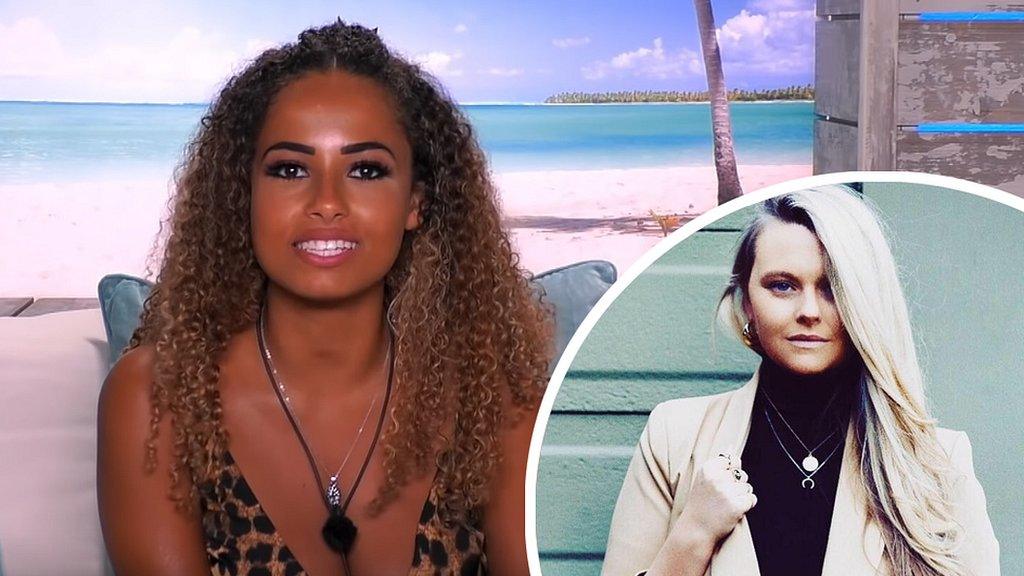
Lusaint (right) saw downloads of her song spike after it was featured on Love Island
Last week, a two-year-old cover of En Vogue's Don't Let Go (Love) became the UK's most sought-after song.
Recorded by emerging singer-songwriter Lusaint, the track was searched for 23,000 times in 24 hours on the music-discovery app Shazam - breaking Florence + The Machine's record for the most Shazams in a single day.
Within hours, the song jumped into the iTunes download chart at number 23; and by the end of the week, Lusaint was in the top 10 of Spotify's viral song chart.
All of this came off a single play, lasting a few seconds, as Michael and Amber fumbled their first kiss on Love Island.
"Not quite sure how this has happened," the Manchester-based singer told her 726 Facebook followers, external. "What a crazy few days."
Allow YouTube content?
This article contains content provided by Google YouTube. We ask for your permission before anything is loaded, as they may be using cookies and other technologies. You may want to read Google’s cookie policy, external and privacy policy, external before accepting. To view this content choose ‘accept and continue’.
It's not the first time Love Island has helped break a new artist. Freya Ridings' single Lost Without You won a platinum disc last summer after soundtracking a pivotal moment in the villa. She's now on the Radio 1 playlist with her new single, Castles, and plays one of the main stages at Glastonbury next week.
In some respects, this is nothing new. Ever since Nick Kamen stripped off his Levis to the sound of Marvin Gaye's Heard It Through The Grapevine in 1985, music executives have known the power of a well-placed TV spot.
More recently, Lily Allen and Ellie Goulding have received a career bump from John Lewis Christmas ads; while, in its heyday, an X Factor cover could send the original hurtling back up the charts.
In 2008, three separate versions of Leonard Cohen's Hallelujah were in Christmas Top 40 after Alexandra Burke performed the song in the grand final.
But recently, shows like Love Island, Killing Eve, Peaky Blinders, Master Of None and The End of the F***ing World have been making smarter, more creative uses of music.
"Sync" - the industry term for placing a song in a film, TV show, advertisement or video game - is the second fastest-growing sector of the music industry after streaming. According to the BPI, sync revenues were worth £25.5m last year, up from £22.9m in 2017. And the people benefitting most are new artists.
"It's massively, massively important for them," says Andrew Howell, senior creative and licensing manager at Warner Chappell Music.
"It's such a powerful promotional vehicle for them to get their music heard. Because if they can't get their music on the radio and we find them a really good spot on TV, it can really take off."
The first drama to fluently speak the language of pop was the original incarnation of Beverly Hills 90210 - where guest appearances from bands like Flaming Lips, the Cardigans, Christina Aguilera and the Cramps grounded its characters in contemporary culture.
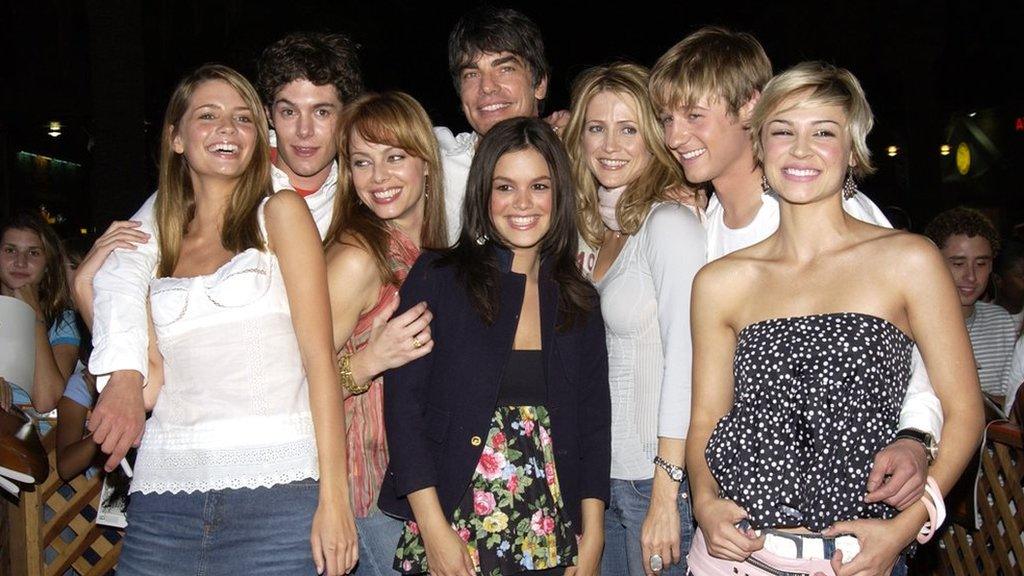
The OC premiered new music by Beck and the Beastie Boys, and helped give indie bands like Death Cab For Cutie a wider audience
In the 2000s, The OC and Grey's Anatomy took it a step further, using new and unreleased tracks to heighten the emotions of their pivotal scenes.
The music supervisor on both shows was Alexandra Patsavas, who told the BBC, external she'd make compilation CDs for all the key characters, identifying the sort of bands they'd be into, and creating a sonic identity for the series.
"As we get to know that character better, the taste becomes more refined and defined," she explained. "But the songs have to support the drama. That's the most important task."
The process on Love Island is not too dissimilar, says ITV's head of music, Karen Craig.
Five music supervisors work on the show - starting work in February, four months before the housemates arrive in Majorca, to build up a library of potential songs.
"We sort of know certain songs, which is part of the research, which might work in certain scenes," says Craig. "So you might have break-up music, happy music, morning music. You put it into categories where you think it might work - purely because [each episode] needs to be turned around so quickly.
"But you can't necessarily plan too far ahead, because you don't know who's going to be falling out with whom or who's hooking up with whom. You have to be very reactive."
On a typical night, Love Island's soundtrack will mix big names such as Arctic Monkeys and Maroon 5 together with complete unknowns and obscure cover versions. But it wasn't always that way. In the first series, five years ago, the brief was to make the music cool and cutting-edge - but producers struggled to get those songs cleared for use.
"When we first did the show and started talking to music publishers and labels they weren't that keen, if I'm honest," says Craig.
"They were a little bit like 'Oh, Love Island's a trashy show' and, to be fair, it was slightly different format-wise [in the beginning]. It was much more sexual and you'd see people drinking and smoking. Whereas now, it's very different. We've sanitised it a little bit.
"So I think it's something that happened organically. We didn't set out to do that - and it took a couple of series before we realised how important the music was, and what a big effect it was having."
People say 'no'
That reflects a shift in attitude, says Howell, especially when it comes to placing music in advertisements.
"Sync is not a dirty word any more," he says. "It's not selling out. It's just another way to earn money, keep the wolf from the door, and get your music heard."
Artists can still be protective of their songs, though - especially if they're being used to soundtrack scenes of drug-taking, sex or aggression.
"I have had a couple of people say 'no' to Killing Eve because of the violence," admits Catherine Grieves, who programs the show with composer David Holmes.
"We use a lot of vintage music - so we're approaching artists who had a hit in 1967, who are now in their 80s in a small town in France. They have no idea what the show is and you give them the scene description with a violent murder, and there's no way they'll agree to it.
"It's frustrating, but you have to respect the artist."

Catherine Grieves helps put together the female-centric soundtrack for Killing Eve with David Holmes
Grieves, whose credits also include Wolf Hall, Call The Midwife and You Were Never Really Here, specialises in tracking down obscure, quirky songs that underscore the "emotional and geographical" journeys of the characters.
One of her favourite discoveries on the latest series of Killing Eve was Vlinder Van Een Zomer - a Dutch version of Angel Of The Morning by Willeke Alberti - which soundtracks Villanelle at her most vulnerable and human, after carrying out a hit in Amsterdam.
"That was quite a tricky find - because most Dutch artists sing in English," says Grieves. "So to find music that worked with our sound but also had Dutch lyrics was quite tricky. But I came across that track and it was one of those Eureka moments."
Unlike Love Island's music supervisors, Grieves tries to avoid contemporary music and well-known songs. That's partly a budgetary concern, but also because audiences have their own memories and associations with pop classics, that can distract them from the narrative.
"As soon as you use something famous, the audience suddenly goes, 'Oh, that's David Bowie!'
"It can take you out of the show - but if it's something you've never heard before, it becomes part of our world. As a music supervisor, it's really powerful when people go, 'Oh, that's the song from Killing Eve' rather than 'Oh, that's a song I heard on Killing Eve'."
The Love Island crew feel the same. "There's some tried and tested tunes that work very well," says Karen Craig, "but more and more, we want to have music that hasn't been played anywhere else or that people haven't heard."
Allow YouTube content?
This article contains content provided by Google YouTube. We ask for your permission before anything is loaded, as they may be using cookies and other technologies. You may want to read Google’s cookie policy, external and privacy policy, external before accepting. To view this content choose ‘accept and continue’.
For new artists, this represents a huge opportunity, especially in an era without Top of the Pops - the one-time place to hear new music.
Diligent music supervisors are actively out there, scouring Soundcloud and YouTube for promising new talent.
Getting a sync might not make you famous, says Grieves, "but the fees can certainly help fund your next EP".
So if you end up soundtracking a snog (or a vicious psychopathic murder), how do you capitalise on the exposure? Andrew Howell has some advice.
"Say you get told you'll be on Love Island: You start shouting about it, you make yourself more visible to your audience, and make sure there's more music there for people to hear.
"If people find your music on Love Island and Shazam it but you've only got one song, suddenly your opportunity is gone. People want to see where you've come from, what you've progressed to, what you'll be doing next.
"It's down to you to make the most of it."

Follow us on Facebook, external, on Twitter @BBCNewsEnts, external, or on Instagram at bbcnewsents, external. If you have a story suggestion email entertainment.news@bbc.co.uk, external.
- Published4 January 2017
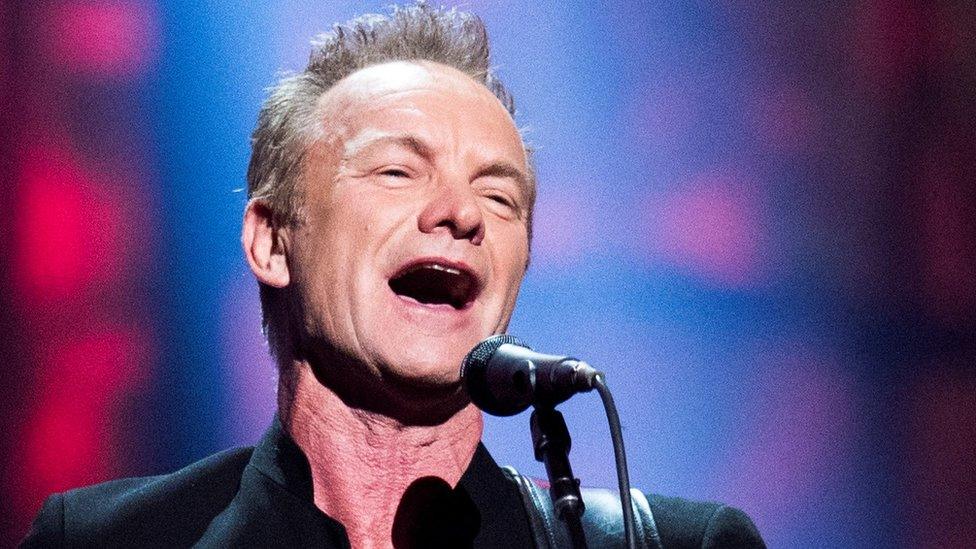
- Published1 November 2018
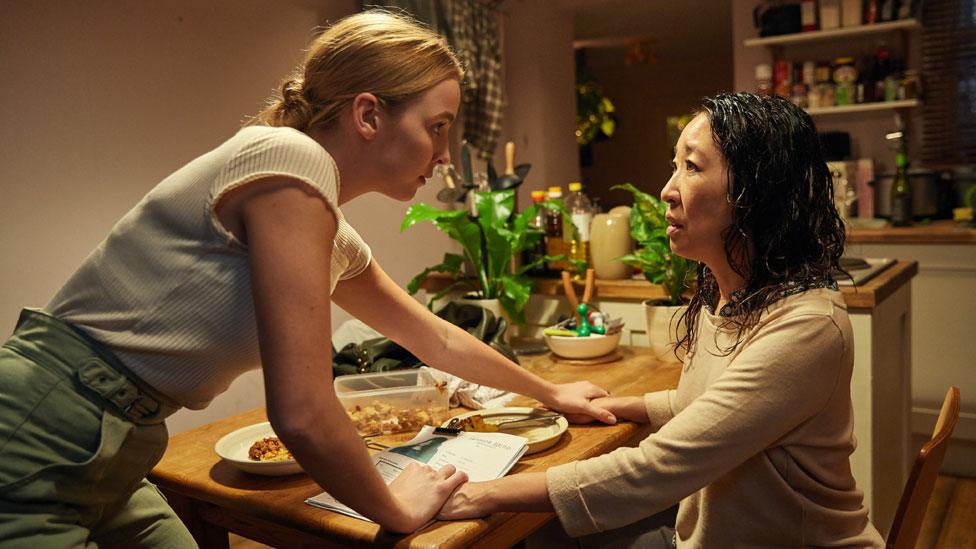
- Published18 June 2017
